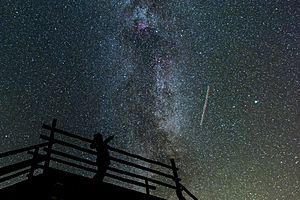Observation facts for kids

Observation is when a living being, like a human, uses their senses to gather information about something. It's about understanding a phenomenon and adding that new knowledge to what you already know.
Observation is more than just looking. To truly observe, you need to pay close attention and try to learn something new.
Sometimes, observations made by instruments that "define themselves" (like a person's personal feelings) can be tricky. These observations are hard to repeat exactly the same way. This makes them less useful in exact sciences like physics.
That's why scientists often use special tools. These engineered instruments help make observations more accurate and reliable. Examples include:
- Spectrometers (to study light)
- Oscilloscopes (to see electrical signals)
- Cameras (to record images)
- Telescopes (to see far-away objects)
- Interferometers (to measure tiny distances)
- Tape recorders (to record sound)
- Thermometers (to measure temperature)
- Clocks and scales (to measure time and weight)
These tools improve the accuracy and quality of the information gathered. Science has been very successful because its observations are accurate and objective. Objective means they can be repeated by others and get the same results.
How Observation Helps in Science
The Scientific method is a way to investigate things, gain new knowledge, or improve what we already know. For something to be called "scientific," it must be based on things we can observe, measure, and test.
A scientific method involves:
- Collecting data through observation and experiments.
- Forming ideas (hypotheses) to explain what you see.
- Testing these hypotheses.
Even though different science fields have different ways of working, they share some key features. Scientists suggest hypotheses to explain phenomena. Then, they design experiments to test these ideas. These steps must be repeatable. This means other scientists should be able to do the same experiment and get similar results.
Bigger ideas, called theories, can connect many hypotheses. This helps to form new hypotheses or put groups of ideas into context.
Scientists also believe that the process should be objective. This helps to avoid personal opinions from affecting the results. It's also important to write down and share all data and methods. This way, other scientists can check the work and try to repeat the results. This practice, called full disclosure, helps to make sure the data is reliable.
Testing and Improving Scientific Ideas
The scientific process is like a cycle. At any point, a scientist might need to go back and repeat an earlier step.
- If a scientist can't come up with an interesting hypothesis, they might need to rethink what they are studying.
- If a hypothesis doesn't lead to clear, testable predictions, the scientist might change the hypothesis or the subject.
- If an experiment doesn't give interesting results, the scientist might change the experiment, the hypothesis, or the subject.
Other scientists can join the process at any stage. They might use the same observations and create their own hypothesis. Or they might use an existing hypothesis and make their own predictions. Often, the person who makes a prediction isn't the one who does the experiment. Also, observations might be based on experiments done by someone else.
Published results from experiments can also act as a hypothesis. They predict that if someone else does the same experiment, they will get the same results.
See also
 In Spanish: Observación para niños
In Spanish: Observación para niños
 | Ernest Everett Just |
 | Mary Jackson |
 | Emmett Chappelle |
 | Marie Maynard Daly |

